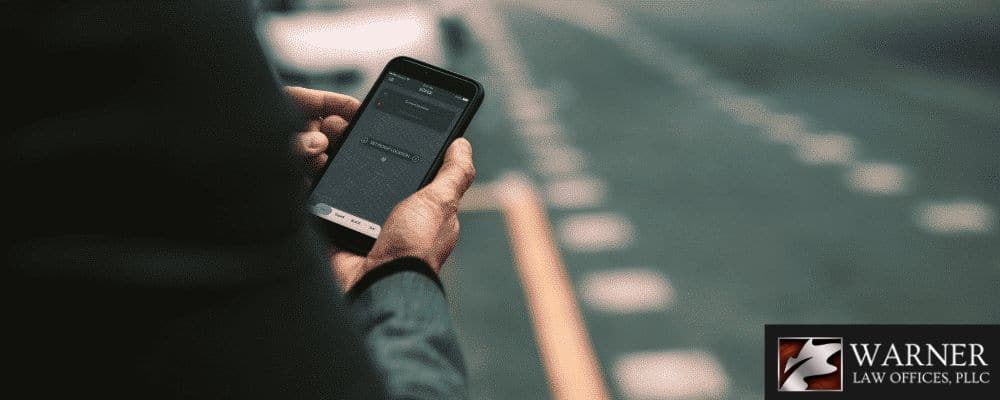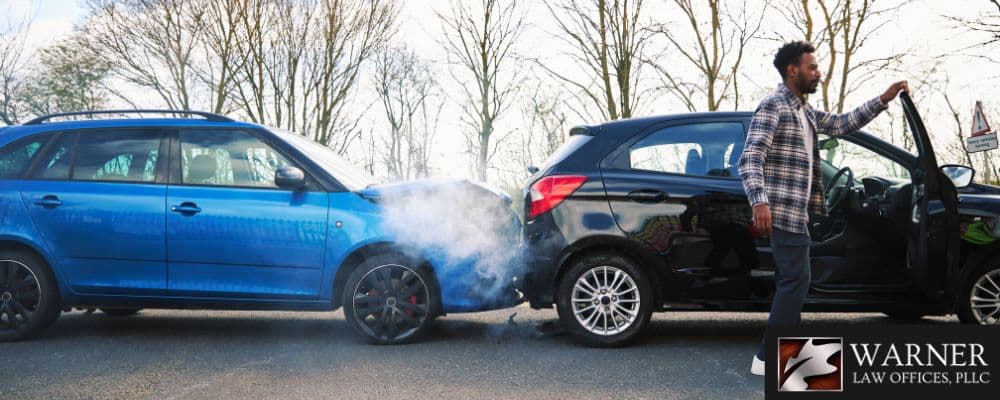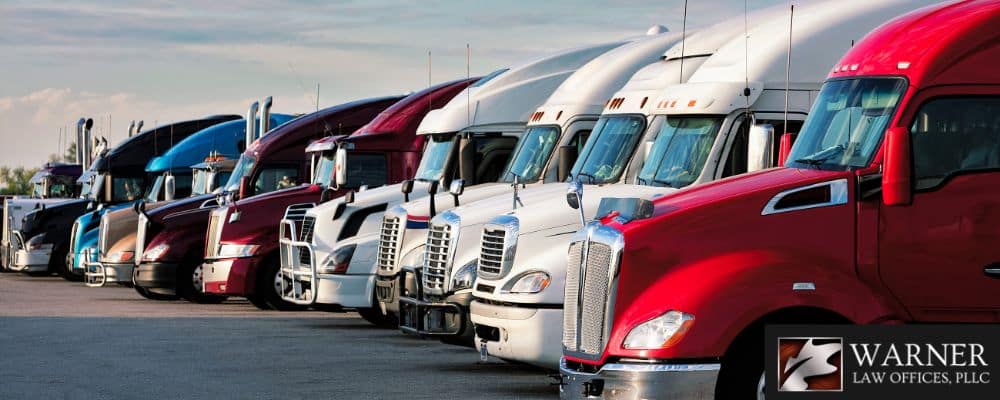
Who is liable for a rideshare accident? This is an important question if you were a passenger, pedestrian, or another driver injured by an Uber, Lyft, or other rideshare vehicle.
The experienced rideshare accident attorneys at Warner Law Offices, PLLC, are dedicated to helping accident victims like you get full compensation for their injuries. We provide a free consultation to determine whether you have a case against the party or parties who are liable for your injuries.
Who Can Be Held Liable for an Uber or Lyft Car Accident?
If you were injured in an accident while riding as a passenger in an Uber or Lyft, you may be entitled to compensation if another person or company was at fault. As a passenger, it’s extremely unlikely that you would be at fault. However, depending on the situation of the crash, several parties might be held responsible:
- The Uber or Lyft driver, if the driver’s negligence caused or contributed to the accident
- The driver of another vehicle, if that other vehicle caused the accident
- The rideshare company, in certain cases
Determining liability depends heavily on your case’s circumstances. An experienced Charleston WV Uber and Lyft accident attorney from Warner Law Offices, PLLC can investigate the accident, analyze your case, and determine who was at fault.
When Is a Rideshare Driver Liable for a Crash?
The rideshare driver may be held liable if their negligence caused your injuries. To prove negligence, your rideshare accident lawyer will need to prove four things:
- Duty: The rideshare driver had a duty to drive safely. All drivers on public roads have this duty.
- Breach: The rideshare driver did not use reasonable care to drive safely.
- Causation: The breach—the driver’s failure to drive safely—was the cause or a contributing cause of the accident.
- Damages: You suffered expenses and losses, such as medical expenses, lost income, and emotional suffering, because of your accident injuries.
Every rideshare driver must use reasonable care to protect others’ safety. There are many ways that a driver can fail to meet the “reasonable care” standard, including:
- Violating traffic laws and rules
- Being impaired by alcohol or drugs
- Driving too fast for the road or weather conditions
- Getting distracted by using their phones, turning around to talk to passengers, or doing anything else that involves taking their eyes off the road or otherwise not paying attention to their driving
- Driving too long without a break and becoming drowsy
- Driving while ill
- Failing to maintain their vehicle in a safe condition
An essential step in a rideshare accident claim or lawsuit is ascertaining whether the driver was negligent and, if so, gathering evidence to prove it. The skilled personal injury attorneys at Warner Law Offices, PLLC have the experience, skill, and access to resources to thoroughly investigate the rideshare accident and determine if the driver was driving negligently and if that caused the accident.
How Much Can You Receive in Damages in a Rideshare Accident?
The compensation you receive depends on several factors, including the injury’s severity, insurance policy limits, and state laws. The more serious your injuries and required treatment are, the more money you can likely anticipate to receive in damages.
Compensation is available for your medical expenses, income losses, pain, suffering, disfigurement, and disabilities for as long as you are expected to experience these costs and losses. The Warner Law Offices, PLLC personal injury attorneys fight hard for their clients’ right to get the maximum compensation allowable under the law.
We will gather evidence of your expenses and losses, which may include expert testimony, and use that proof to build a compelling case showing the extent of your needs. If you work with us, we will pursue compensation to cover quality medical care, offset lost income, and compensate you and your family for your pain and suffering and other losses.
When Is Uber or Lyft Responsible for an Accident?
Employers may sometimes be held financially responsible for the harmful actions of their employees under the legal doctrine of respondeat superior. However, when you are dealing with rideshare accidents, there’s a complicating factor. In most states, Uber and Lyft drivers are considered independent contractors, not employees. Respondeat superior only applies when there is an employer-employee relationship and doesn’t apply to independent contractors.
Is Uber liable for accidents? The answer may depend on the state where the accident occurred. In a few states, Uber and Lyft drivers may be considered employees, not independent contractors. Proposed legislation, new regulations, and ongoing litigation aim to settle the employee-independent contractor question. Sometimes, the decisions go back and forth. Liability issues are still very much in flux.
West Virginia law regulates various aspects of transportation network companies such as Uber and Lyft. The law has specific minimum insurance requirements. Either the drivers or the companies must provide insurance. Typically, rideshare companies’ policies cover drivers when they are logged on to the company’s digital network or engaged in a prearranged ride.
The experienced Warner Law Offices, PLLC rideshare accident attorneys keep abreast of the current status of the laws affecting rideshare company liability. If you work with us, we will analyze your case according to the current law in your state and advise you whether Uber or Lyft can be held responsible for their drivers’ negligent actions. We always seek to hold as many parties responsible as the law allows to give you the best chance of receiving full and fair compensation.
Do Uber and Lyft Insure their Drivers?
Is Uber responsible for accidents? Sometimes. Uber and Lyft provide commercial liability insurance coverage for their drivers, even for drivers not classified as employees. This insurance goes into effect if the driver has logged into the app. This gives you the right to file a claim against the rideshare company’s insurance policy.
If the driver is waiting to get a ride request, the insurance limits are lower than if the driver is picking up or carrying passengers. If you were injured in a car accident as a passenger, you will be eligible for the highest insurance limits. However, if the driver’s app is turned off, Uber and Lyft are not liable. The commercial insurance policy does not apply, and you must file against the driver’s personal insurance policy.
Uber and Lyft insurance coverage in West Virginia:
| Uber | Lyft |
Driver’s app is turned off | No coverage from Uber. Claims can be made only against the driver’s personal insurance policy. | No coverage from Lyft. Claims can be made only against the driver’s personal insurance policy. |
App is on, and driver is waiting for a ride request | Third-party liability, when necessary:
| Third-party liability, when necessary:
|
App is on, and driver is picking up or carrying passengers |
|
|
| Uber | |
| Driver’s app is turned off | No coverage from Uber. Claims can be made only against the driver’s personal insurance policy. |
| App is on, and driver is waiting for a ride request | Third-party liability, when necessary:
|
| App is on, and driver is picking up or carrying passengers |
|
| Lyft | |
| Driver’s app is turned off | No coverage from Lyft. Claims can be made only against the driver’s personal insurance policy. |
| App is on, and driver is waiting for a ride request | Third-party liability, when necessary:
|
| App is on, and driver is picking up or carrying passengers |
|
Let Warner Law Offices Fight For You
Contact the skilled and experienced rideshare accident attorneys at Warner Law Offices, PLLC, for a free consultation to discuss your legal options. We will use our 20+ years of experience to help you determine who is liable for your rideshare accident and whether you should take action against them.
We’ve won millions of dollars for our clients, have a proven track record of success, are known for our aggressive advocacy, and are dedicated to achieving justice for people like you in West Virginia and the surrounding areas. You don’t have to pay us anything unless we win your case. Call us at (304) 345-6789 or contact us online for advice on what you should do next.




